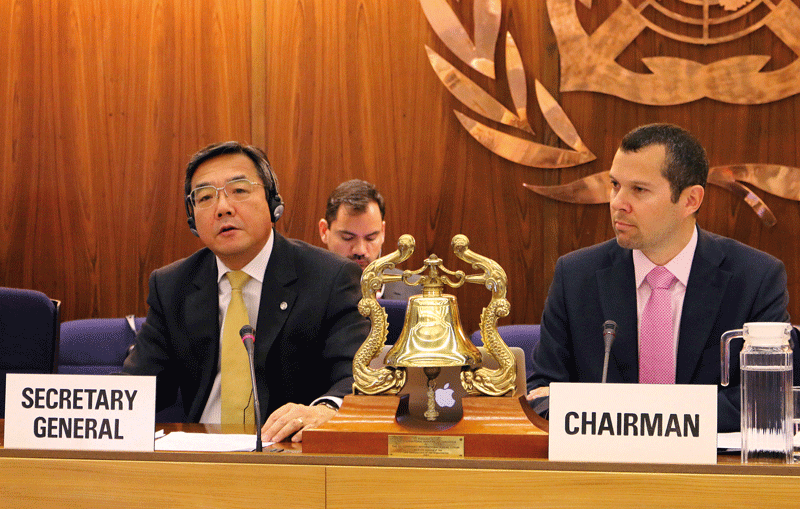
Implementation date for Tier III NOx standards confirmed

IMO Secretary-General Koji Sekimizu (left) and the chairman of MEPC 66, Arsenio Dominguez, Panama
Among other things, the committee agreed on the date for introduction of Tier III NOx limits contained in Regulation 13 of MARPOL Annex VI. The delegates rejected a proposal from MEPC 65 to postpone their entry into force until 2021 and decided that the Tier III NOx limits would be implemented in 2016. Specifically, this means the standard will be applied to a marine diesel engine installed on a ship constructed on or after January 1st 2016 and that operates in the North American ECAs or the US Caribbean ECA – only certain recreational vessels will be exempted from the regulation.
The regulation is valid for diesel engines with a power output of 130 kW or more and requires a 75% to 80% reduction of NOx emissions.
It will also apply to vessels operating in ECAs that might be designated for Tier III NOx control in the future (such as the North and Baltic seas). In this case, Tier III standards would apply to ships constructed on or after the date of adoption of such an ECA by the MEPC, or a later date as may be specified in the amendment designating the NOx Tier III ECA, the IMO reported.
As the only exception, the Tier III requirements do not apply to a marine diesel engine installed on a ship constructed prior to January 1st 2021 of less than 500gt and of 24m or more in length that has been specifically designed – and is used solely – for recreational purposes such as yachts.
The amendments are expected to enter into force on September 1st 2015.
Extension of EEDI
The MEPC also adopted amendments to MARPOL Annex VI concerning the extension of the application of the Energy Efficiency Design Index (EEDI) to LNG carriers, RoRo vessels and cruise ships with non-conventional propulsion. Ships that are not propelled by mechanical means, such as barges, and independently operating cargo ships with ice-breaking capability, were exempted from this rule, which is expected to enter into force on September 1st 2015.
Draft Polar Code reviewed
During the five-day meeting, the delegates further reviewed the environmental requirements under the proposed draft International Code for Ships Operating in Polar Waters (Polar Code). It also considered the proposed draft amendments to MARPOL to make the Polar Code mandatory.
The draft Polar Code covers the full range of design, construction, equipment, operation, training, search and rescue, and environmental protection matters relevant to ships operating in the inhospitable waters surrounding the two poles. It includes requirements covering the prevention of oil pollution, the prevention of pollution from noxious liquid substances from ships, the prevention of pollution by sewage from ships and the prevention of pollution by discharge of garbage from ships.
Sulphur review correspondence group established
The timing of the review on the control of SOx emissions from ships and the availability of compliant fuel oil to meet the requirements set out in the regulation was another topic on the agenda. The sulphur content of fuel oil used on board ships is required to be a maximum of 3.5% m/m outside an ECA), falling to 0.50% m/m on and after January 1st 2020. Depending on the outcome of a review regarding the availability of compliant fuel oil, to be completed by 2018, the requirement may be deferred to January 1st 2025.
The committee agreed to establish a correspondence group to develop the methodology to determine the availability of fuel oil to comply with the fuel oil standard set out in regulation 14.1.3 of MARPOL Annex VI. The group would provide a progress report to MEPC 67, with a view to the committee adopting the terms of reference of the study at MEPC 68 in 2015.
Ballast water management systems approved
The MEPC granted basic approval to four, and final approval to two ballast water treatment systems (BWTS) that make use of active substances.
In addition, the committee requested the secretariat to explore the possibility of conducting a study on the implementation of the ballast water performance standard described in regulation D-2 of the Ballast Water Management Convention, with the aim to address a number of industry concerns, including proposals to amend the guidelines for approval of ballast water management systems (G8).
Regarding the status of the International Convention for the Control and Management of Ships’ Ballast Water and Sediments, 2004, the MEPC noted that the number of contracting governments currently stood at 38, representing 30.38% of the world’s merchant fleet tonnage (35% is needed for the convention to enter into force), and urged those states that had not yet ratified the convention to do so at the earliest possible opportunity.
Ship recycling convention implementation reviewed
A further subject was the report of a correspondence group that had been tasked with developing threshold values and exemptions applicable to the materials to be listed in Inventories of Hazardous Materials, required under the Hong Kong International Convention for the Safe and Environmentally Sound Recycling of Ships, 2009. At MEPC 66 it was agreed that further work was needed.
The correspondence group was thus re-established to finalise the development of threshold values, exemptions and bulk listings.
Guidelines for the reduction of underwater noise approved
The MEPC also approved guidelines for the reduction of underwater noise from commercial shipping to address adverse impacts on marine life, recognising that underwater noise radiating from commercial ships may have both short- and long-term negative consequences on marine life.
